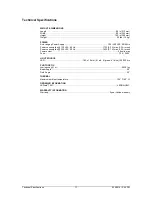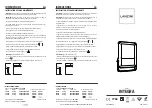
5. Appendix
13
4/19/2010 12:44 PM
Data Cabling
To link fixtures together you must obtain data cables. You can purchase CHAUVET® certified DMX
cables directly from a dealer/distributor or construct your own cable. If you choose to create your own
cable please use data-grade cables that can carry a high quality signal and are less prone to
electromagnetic interference.
DMX Data Cable
Use a Belden© 9841 or equivalent cable which meets the specifications for EIA RS-485 applications.
Standard microphone cables cannot transmit DMX data reliably over long distances. The cable must
have the following characteristics:
Type:
shielded, 2-conductor twisted pair
Maximum capacitance between conductors:
30 pF/ft
Maximum capacitance between conductor and shield:
55 pF/ft
Maximum resistance:
20 ohms/1000 ft
Nominal impedance:
100 ~ 140 ohms
Cable Connectors
Cabling must have a male XLR connector on one end and a female XLR connector on the other end.
Do not allow contact between the common and the fi
xture’s chassis ground. Grounding the
common can cause a ground loop, and your fixture may perform erratically. Test cables with
an ohm meter to verify correct polarity and to make sure the pins are not grounded or shorted
to the shield or each other.
Fixture Linking
You will need a serial data link to run light shows of one or more fixtures using a DMX controller or to
run synchronized shows on two or more fixtures set to a master/slave operating mode. The combined
number of channels required by all the fixtures on a serial data link determines the number of fixtures
the data link can support.
Fixtures on a serial data link must be daisy chained in one single line. To comply with the EIA-
485 standard, no more than 32 fixtures should be connected on one data link. Connecting
more than 32 fixtures on one serial data link without the use of a DMX optically-isolated
splitter may result in deterioration of the digital DMX signal.
Maximum recommended serial data link distance: 500 m (1640 ft)
Maximum recommended number of fixtures on a serial data link: 32
COMMON
DMX +
DMX
-
INPUT
OUTPUT
1
3
2
1
3
2
1
3
2
120 ohm ¼ W
resistor between
pin 2 (DMX -) and
pin 3 (DMX +) on
the output of the
last fixture
To avoid signal transmission problems
and interference, it is always advisable to
connect a DMX signal terminator.
DMX connector configuration



































